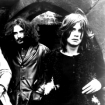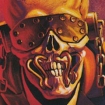Like almost all musical styles, post-hardcore is a genre descriptor that's been properly and improperly used to describe an ever-widening breadth of artists throughout the years. And in fairness, with such an open-ended and unspecified nomenclature, it's not necessarily wrong, per se, for someone to consider both Underoath and Dag Nasty post-hardcore — completely different bands, totally different sides of the coin, but still part of the same ring of silver.
Generally, though, the term post-hardcore is used to describe a simultaneously vague yet specific style of aggressive music that emerged after the initial wave of hardcore receded in the mid-Eighties, when bands ranging from Hüsker Dü to Rites of Spring began envisioning a broader sonic palette that was still fueled by hardcore's primal chutzpah. In the Nineties, the post-hardcore torch was passed onto bands like Fugazi and Quicksand, then At the Drive-In and Glassjaw, and today, the many genre-adverse acts who, unconsciously or not, draw from that creatively vital wellspring.
When we asked our readers to pick the single greatest post-hardcore band ever, our people understood the assignment, and below are the top five vote-getters, ranked accordingly.
5. Alexisonfire
Alexisonfire were architects of the way post-hardcore evolved in the 2000s. Threading together twin-guitar shredding, throaty yelps and ragged yet anthemic emo choruses, their essential first two albums, 2002's self-titled and 2004's "Watch Out!", can be heard echoing in the music of everyone from Underoath and Chiodos to Dance Gavin Dance and Pierce the Veil. Their more recent output has ventured further into the "post" side of the genre, so their search for new sounds and feelings beyond hardcore's fiefdom remains pivotal.
4. Quicksand
While post-hardcore as a scene, sound and ethos sprung from the always ambitious D.C. region, Quicksand gave it a New York-ian flair. Their monumental 1993 debut, Slip, outfitted Fugazi's reggae-influenced rhythms with heavier guitars and a spikier vocal delivery from frontman Walter Schreifels, who had made his bones flinging across stages in the seminal youth crew hardcore bands Gorilla Biscuits and Youth of Today. From 1995's even more cerebral Manic Compression to their pair of recent reunion albums, Quicksand are still widening heavy music's boundaries and, in turn, the chalk borderlines of post-hardcore itself.
3. At the Drive-In
At the Drive-In burned bright and fast — forming in 1994, building up a reputation as the most effervescently thrilling live band in heavy music, and then tragically crumbling once they got their shot at commercial fame with 2000's Ross Robinson-produced, major label-released genre staple, Relationship of Command. To this day, Cedric Bixler-Zavala and Omar Rodríguez-López's uncontrollable energy and equally sharp, disarming wit make them two of post-hardcore's defining idols; musicians who harnessed the power of hardcore, but aimed their creativity upwards and out instead of downwards and around.
2. Fugazi
Fugazi are post-hardcore in the truest sense — the project that Ian MacKaye used to lunge beyond the foundational hardcore outcries of Minor Threat and the tear-stained emo-core pleas of Embrace — having shaped a musical landscape outside of hardcore, but not in opposition to it. Their seven-song debut codified the genre this list is heralding, and every proceeding album challenged the one before it to break molds, minds and moshing conventions.
1. Glassjaw
Surely, half the people reading this list are fuming that Glassjaw were voted No. 1 above Fugazi. If you indeed feel ready to combust with rage, perhaps a Glassjaw song might help quell your fury? On their landmark first two albums, Daryl Palumbo and Justin Beck outfitted post-hardcore for the 21st century, borrowing the alt-metal groove of Quicksand and Helmet and thrashing it to pieces with songs that rattled and exploded, shrieked and cooed, blazed and smoldered. An entire generation (or two) of heavy bands wouldn't exist without Glassjaw, but for all their imitators, no one's ever matched their singular brilliance. The best post-hardcore band ever? They just might be.








